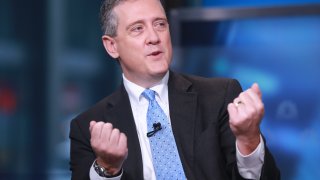
- Bitcoin does not present a serious threat to U.S. dollar's status as the world's reserve currency, according to St. Louis Federal Reserve President James Bullard.
- "I just think for Fed policy, it's going to be a dollar economy as far as the eye can see," Bullard told CNBC on Tuesday.
- The central banker expressed concerns about the proliferation of privately issued digital currencies.
St. Louis Federal Reserve President James Bullard told CNBC on Tuesday he believes increasing interest in bitcoin does not pose a serious threat to the U.S. dollar as the world's reserve currency.
"I just think for Fed policy, it's going to be a dollar economy as far as the eye can see — a dollar global economy really as far as the eye can see — and whether the gold price goes up or down, or the bitcoin price goes up or down, doesn't really affect that," Bullard said on "Squawk Box."
Bitcoin, in particular, has been championed by crypto bulls as a store of value that can be used to hedge against inflation or the debasement of fiat currencies like the dollar. Some have touted it as "digital gold." In addition, bitcoin and other cryptocurrencies also present themselves as a way to buy goods and services like actual money.
Bullard, who has led the St. Louis Fed since 2008, expressed concerns about widespread transactions using a range of cryptocurrencies that are not issued by governments. "Dollars can be traded electronically already, so I'm not sure that's really the issue here. The issue is privately issued currency," he said.
Before the Civil War, it was common for banks to issue their own notes, Bullard said. He likened it to Bank of America, JPMorgan and Wells Fargo all having distinct brands of dollars. "They were all trading around and they traded at different discounts to each other, and people did not like it at all," he said.
Money Report
"I think the same thing would occur with bitcoin here," Bullard said. "You don't want to go to a nonuniform currency where you're walking into Starbucks and maybe you'll pay with ethereum, maybe you'll pay with ripple, maybe you'll pay with bitcoin, maybe you'll pay with a dollar. That isn't how we do this. We have a uniform currency that came in at the Civil War time."
Bullard's comments happened shortly after the price of bitcoin eclipsed $50,000 per coin for the first time. The latest leg higher for bitcoin follows moves into the crypto space by established financial firms such as BNY Mellon and Mastercard.
Tesla also announced last week it bought $1.5 billion worth of bitcoin using cash on its balance sheet and planned to accept the digital coin as payment for its products. The electric vehicle maker's action was viewed by some as another major step toward broad acceptance of bitcoin, which is the world's largest digital currency by market value.
While Uber doesn't plan to buy bitcoin as an investment, CEO Dara Khosrowshahi said it's possible the ride hailing and food delivery company would eventually allow customers to pay with digital coins. "Just like we accept all kinds of local currency, we are going to look at cryptocurrency and/or bitcoin in terms of currency to transact," Khosrowshahi told CNBC on Thursday. "That we'll certainly look at and if there's a benefit there, if there's a need there, we'll do it. We're just not going to do it as part of a promotion."
When considering whether cryptocurrencies present a threat to the dollar, Bullard stressed there's nothing new about competition. It's something that has gone on for centuries, he said. "It is a currency competition, and investors want a safe haven. They want a stable store of value, and then they want to conduct their investments in that currency," the St. Louis Fed president said.
For example, he contended both the euro and the yen are strong currencies. However, "neither of those is going to replace the dollar," he said. "It'd be very hard to get a private currency that's really more like gold to play that role so I don't think we're going to see any changes in the future."






